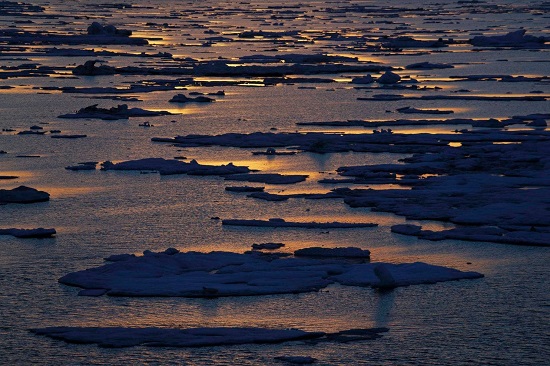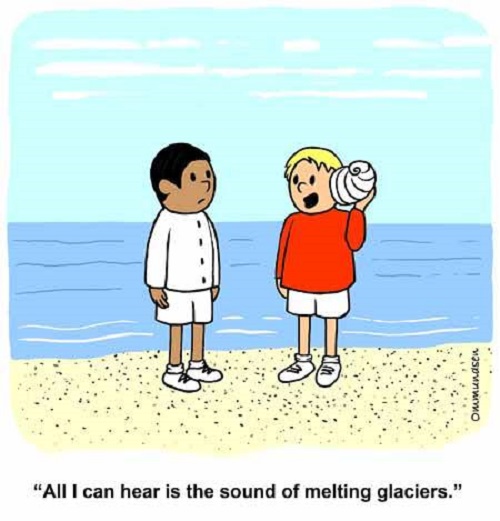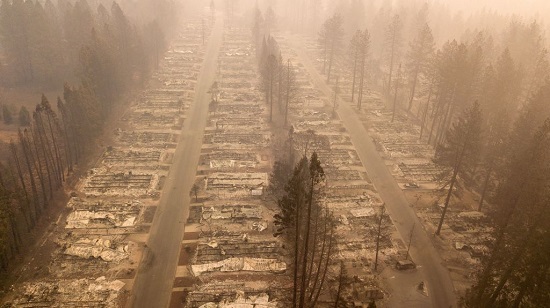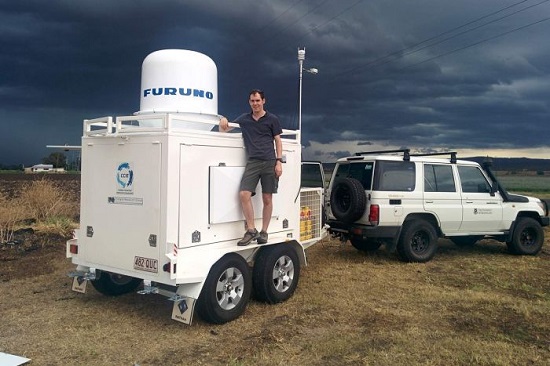2018 SkS Weekly Climate Change & Global Warming Digest #46
Posted on 18 November 2018 by John Hartz
Story of the Week... Toon of the Week... SkS in the News... Photo of the Week... SkS Spotlights... Coming Soon on SkS... Poster of the Week... SkS Week in Review...
Story of the Week...
Scientists acknowledge key errors in study of how fast the oceans are warming
A major study claimed the oceans were warming much faster than previously thought. But researchers now say they can’t necessarily make that claim.

The sun sets over sea ice floating on the Victoria Strait along the Northwest Passage in the Canadian Arctic Archipelago during the summer of 2017. (AP Photo/David Goldman)
Scientists behind a major study that claimed the Earth’s oceans are warming faster than previously thought now say their work contained inadvertent errors that made their conclusions seem more certain than they actually are.
Two weeks after the high-profile study was published in the journal Nature, its authors have submitted corrections to the publication. The Scripps Institution of Oceanography, home to several of the researchers involved, also noted the problems in the scientists' work and corrected a news release on its website, which previously had asserted that the study detailed how the Earth’s oceans “have absorbed 60 percent more heat than previously thought.”
“Unfortunately, we made mistakes here,” said Ralph Keeling, a climate scientist at Scripps, who was a co-author of the study. “I think the main lesson is that you work as fast as you can to fix mistakes when you find them.”
Scientists acknowledge key errors in study of how fast the oceans are warming by Chris Mooney & Brady Dennis, Energy & Environment, Washington Post, Nov 14, 2018
Toon of the Week...

SkS in the News
[To be added.]
Photo of the Week...

In this aerial photo, a burned neighborhood is seen in Paradise, California on November 15, 2018. JOSH EDELSON / AFP / GETTY IMAGES
California Wildfires: Where Is the Climate Change Outrage? by Bruce Melton, Environment & Health, Truthout, Nov 17, 2018
SkS Highlights...
New weather app 'a quantum leap' for understanding extreme events

Dr Soderholm says extreme weather can be missed by instruments because weather radars could not see close to the ground.
New weather app 'a quantum leap' for understanding extreme events by Shelley Lloyd, Weather, ABC News (Australia), Nov 21, 2018
Coming Soon on SkS...
- The Scientific Consensus on Climate Change (Sarah Finnie Robinson)
- Did bombing during second world war cool global temperatures? (Alan Robock)
- New findings on ocean warming: 5 questions answered (Scott Denning)
- Global coal use may have peaked in 2014, says latest IEA World Energy Outlook (Simon Evans)
- New research this week (Ari Jokimäki)
- 2018 SkS Weekly Climate Change & Global Warming News Roundup #47 (John Hartz)
- 2018 SkS Weekly Climate Change & Global Warming Digest #47 (John Hartz)
Poster of the Week...

SkS Week in Review...
- 2018 SkS Weekly Climate Change & Global Warming News Roundup #46 by John Hartz
- New research, November 5-11, 2018 by Ari Jokimäki
- Katharine Hayhoe on Fossil Fuels, Global Weirding Video with Katharine Hayhoe
- The many ways climate change worsens California wildfires by Dana Nuccitelli (Yale Climate Connections)
- Climate science comeback strategies: Al Gore said what? by Karin Kirk (Yale Climate Connections)
- What are the climate change consequences of the midterm elections? by Dana Nuccitelli (Bulletin of the Atomic Scientists)
- 2018 SkS Weekly Climate Change & Global Warming Digest #45 by John Hartz































 Arguments
Arguments






























Unfortunate, but quickly rectified to the credit of the researchers, and perhaps there is a positive side. We have an army of sceptics scrutinising the most important research, and just occasionally they find genuine fault with a research paper. It helps confirm that the vast majority of the research, including the critically important research is robust, a point I hope is not lost on the general public.
Still, it's always a bad look when the process of peer review fails as is the case here, and especially so when it's a climate change contrarian who brings it to public attention.
You would wonder why they would use a proxy method to estimate the heat that has been accumulated in the oceans when we have a direct measurement system in the Argo floats which is orders of magnitude better than any system we have had before. Perhaps they should look back at their proxy method and compare it with the actual measurements and see if the difference is not telling them something interesting.
William, the trouble is the argo floats only measure the surface and only go back about 10 years.
www.eurekalert.org/pub_releases/2018-10/pu-eoh103118.php
Slight correction. Argo "float" measure temperature down to 2000m, so since argo we have very good handle on OHC. But as Nigel says, Argo only go back 14years (from memory) and measurements, especially below 700m get very sparse going back, consequently they have quite large error bars (see here)
Someone criticizing climate science by bringing up this correction, or any other climate science correction, could be a great opportunity to have a discussion about the importance of people being open to changing their minds, especially being open to correcting incorrect beliefs about developed socioeconomic-political systems.
It is well understood that people can be encouraged to develop a personal resistance to being corrected. But as an engineer it was clear to me, and it also seems to be common sense, that it is not helpful to compromise on correcting a misunderstanding when unsustainable or harmful actions would be the result of not fully correcting the misunderstanding.
And an extension of that understanding is that systems that encourage people to develop resistance to being corrected (like systems driven by pursuits of popularity or profitability), rather than encouraging people to improve their awareness and understanding and change what they do accordingly, need to be corrected.
The Sustainable Development Goals are the most robust developed awareness and understanding of what is required for the future of humanity (and justified presentations to improve the SDGs can also be made).
Any developed beliefs and actions that are not aligned with achieving the SDGs can be understood to need to be corrected. And claims that every belief is an equally valid opinion, to evade being corrected, can be understood to be incorrect. Also, claims that everyone's beliefs need to be accommodated and compromised for, also an attempt to evade being corrected, are incorrect.
It is undeniable that people need to be corrected when the potential for harm is involved. And it is undeniable that there is harm being done to future generations (as well as to members of the current generation) by the unsustainable burning of fossil fuels. And the developed resistance to correction regarding climate science is proof that the socioeconomic-political systems that developed such resistance need to be corrected.